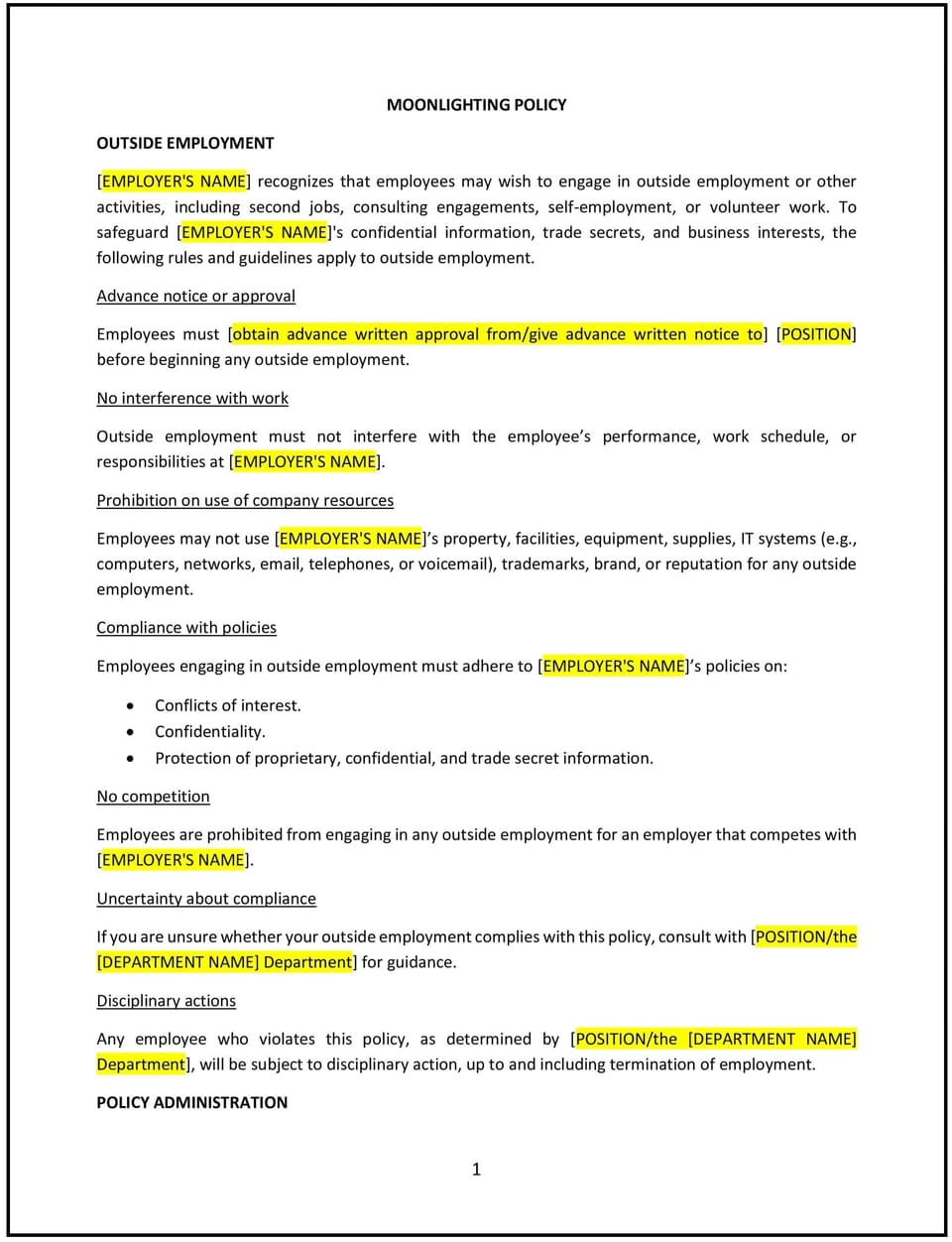Moonlighting policy (Florida): Free template

Moonlighting policy (Florida)
A moonlighting policy helps Florida businesses establish guidelines for employees who engage in secondary employment outside of their primary job. This policy outlines procedures for requesting, approving, and managing moonlighting activities while ensuring that they do not conflict with the primary job or violate company policies. It is designed to promote transparency, reduce risks, and provide clear expectations for employees and managers involved in secondary employment.
By implementing this policy, businesses in Florida can demonstrate their commitment to ethical practices, enhance operational efficiency, and align with the state’s focus on fostering a balanced and professional workplace.
How to use this moonlighting policy (Florida)
- Define moonlighting activities: Clearly specify what constitutes moonlighting, such as working for another employer, freelance work, or running a side business.
- Establish request procedures: Outline how employees should notify the business of their moonlighting activities, including whom to contact and how to document requests.
- Address approval criteria: Explain how businesses should evaluate moonlighting requests based on factors such as potential conflicts, impact on primary job performance, and legal considerations.
- Specify expectations: Provide guidelines on acceptable moonlighting activities, including restrictions on competing with the business or using company resources.
- Communicate the policy: Share the policy with employees during onboarding and through regular communications to ensure awareness and understanding.
- Monitor adherence: Regularly review moonlighting activities and address any concerns or discrepancies promptly.
- Update the policy: Periodically assess the policy to reflect changes in workplace dynamics, legal standards, or business needs.
Benefits of using this moonlighting policy (Florida)
This policy offers several advantages for Florida businesses:
- Promotes transparency: Clear guidelines help ensure that all moonlighting activities are reported and reviewed.
- Reduces risks: Defined procedures minimize the likelihood of conflicts of interest, unauthorized use of company resources, or reputational damage.
- Builds trust: Demonstrates the business’s commitment to ethical practices and employee well-being.
- Aligns with community values: Reflects Florida’s emphasis on professionalism, fairness, and mutual respect in the workplace.
- Enhances reputation: A robust policy showcases the business’s dedication to ethical practices and operational resilience.
- Improves decision-making: Helps businesses anticipate potential conflicts and incorporate safeguards into moonlighting practices.
- Supports growth: A strong framework for moonlighting fosters a culture of accountability and adaptability.
Tips for using this moonlighting policy (Florida)
- Communicate clearly: Ensure employees understand the policy by providing written materials and discussing it during meetings or training sessions.
- Train managers: Educate supervisors on how to handle moonlighting requests fairly and consistently while ensuring compliance with the policy.
- Be transparent: Require employees to disclose all moonlighting activities to ensure transparency and avoid conflicts of interest.
- Stay informed: Keep up with changes in employment laws, regulations, or best practices that may affect moonlighting practices.
- Encourage feedback: Solicit input from employees to identify areas for improvement and ensure the policy meets their needs.
- Review periodically: Assess the policy’s effectiveness and make updates as needed to reflect changes in workplace dynamics or business goals.
Q: Why should Florida businesses adopt a moonlighting policy?
A: Businesses should adopt this policy to promote transparency, reduce risks, and demonstrate their commitment to ethical practices regarding secondary employment.
Q: What types of activities should be considered moonlighting?
A: Businesses should consider activities such as working for another employer, freelance work, or running a side business as moonlighting.
Q: How should businesses handle moonlighting requests?
A: Businesses should evaluate requests based on potential conflicts, impact on primary job performance, and legal considerations, ensuring transparency and fairness.
Q: Should businesses restrict certain moonlighting activities?
A: Businesses should restrict activities that compete with the business, use company resources, or pose a conflict of interest, ensuring alignment with company policies.
Q: How can businesses ensure fairness in moonlighting practices?
A: Businesses should apply the policy consistently across all employees, ensuring that decisions are based on objective criteria and documented evidence.
Q: Should businesses provide training on moonlighting?
A: Businesses should provide training to managers and staff on recognizing moonlighting activities, understanding the policy, and following procedures.
Q: How often should businesses review the policy?
A: Businesses should review the policy annually or whenever there are significant changes in workplace dynamics, legal standards, or business operations.
This article contains general legal information and does not contain legal advice. Cobrief is not a law firm or a substitute for an attorney or law firm. The law is complex and changes often. For legal advice, please ask a lawyer.


